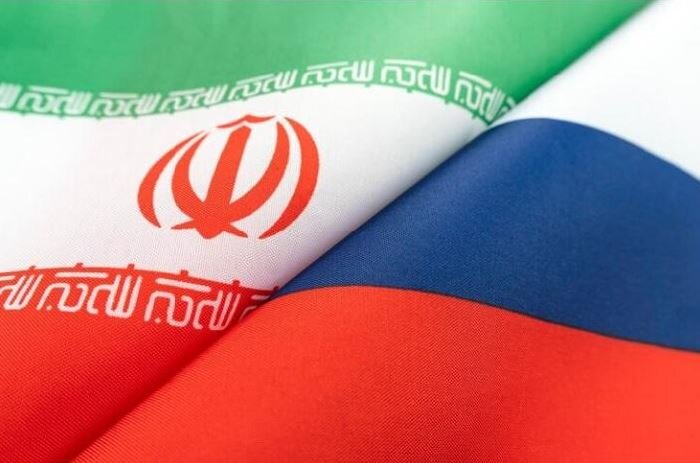Iran, Russia long-term cooperation agreement to be implemented: foreign ministry

TEHRAN – The Iranian Foreign Ministry has confirmed that negotiations on a comprehensive long-term cooperation agreement between Iran and Russia have been successfully concluded.
Ministry spokesperson Nasser Kanaani announced on Monday that the legal and technical discussions surrounding the agreement are complete, and the document is set to be implemented once all necessary processes, including the official signing, have been finalized.
During the weekly press conference, Kanaani addressed the significance of the agreement, noting that it represents the culmination of extensive diplomatic efforts between Tehran and Moscow.
He highlighted that the treaty has undergone thorough technical, legal, and political scrutiny and has received the final approval from both nations' legal delegations.
This development follows Russian President Vladimir Putin's invitation to Iranian President Masoud Pezeshkian to attend the upcoming BRICS summit, where further discussions are anticipated.
Kanaani also commented on the broader geopolitical context, emphasizing the shared political will between Iran and Russia to strengthen bilateral ties and enhance regional stability.
The spokesperson noted that the upcoming BRICS summit would provide additional opportunities for dialogue and cooperation between the two countries, particularly in the areas of economic and political partnership.
‘Iran to seek justice regarding 1953 coup’
In addition to the Iran-Russia agreement, Kanaani addressed other significant topics during the press conference, including the historical grievances stemming from the 1953 coup in Iran.
He informed reporters that the first session of a legal proceeding related to the coup had recently taken place, highlighting Iran's ongoing efforts to seek justice for the damages caused by the actions of the U.S. and British governments.
Kanaani underscored the legal foundations of the case, referencing specific articles of the Iranian Constitution and other legislative measures that compel the government and judiciary to pursue compensation for the harm inflicted on the Iranian people.
‘World is intolerant of Israeli regime’s continued barbarism’
Kanaani further emphasized the urgent need for a ceasefire in Gaza, stating that the global community is increasingly intolerant of more than a decade of "barbarism" by the Israeli regime.
He criticized the international community, particularly the United Nations Security Council, for its inaction, which he believes has allowed these crimes to continue.
He affirmed that Iran supports any sincere effort to establish a ceasefire and noted that Iran has been actively using its resources to halt the conflict in recent months.
Kanaani also questioned the U.S. government's qualifications to mediate the ceasefire, citing its support for Israel and lack of commitment to international peace and security.
He accused the U.S. of being complicit in the ongoing violence, arguing that if the U.S. had genuinely wanted to stop the atrocities in Gaza, it possessed the capability to do so.
Kanaani noted that the ceasefire negotiations involved Palestinian groups and the Israeli regime, which has killed more than 40,000 people in the past ten months and showed no interest in ending the conflict.
He stated that the Hamas movement, as the main Palestinian negotiator, also perceives Israel's lack of interest in a ceasefire.
Osama Hamdan, who represents Hamas in Lebanon, said on Saturday that there is no real will on the part of the U.S. to establish a ceasefire in the Gaza Strip.
According to Kanaani, the responsibility now lies with Israel and the U.S., and the actions of the U.S. government will be scrutinized. He added that Iran has maintained consultations with regional allies to discuss its stance on the situation.
Israel waged its genocidal war on the besieged Gaza Strip on October 7, 2023, after Hamas carried out its historic operation against the occupying entity in retaliation for the regime’s intensified atrocities against the Palestinian people.
So far, the Tel Aviv regime has killed at least 40,139 Palestinians, mostly women and children, and injured 92,609 others, according to reports from the battered enclave’s Health Ministry.
Over nine months into the Israeli war, vast tracts of Gaza lie in ruins amid a crippling blockade of food, clean water and medicine.
Successive rounds of talks have failed to broker a truce in the brutal Israeli onslaught on Gaza.
‘Iran does not aim to escalate regional tensions’
Addressing concerns about regional security, Kanaani clarified that Iran is not seeking to escalate tensions but emphasized Iran's legitimate right to respond to aggression.
He reiterated that Iran remains the strongest regional and international supporter of a ceasefire but stressed that this stance does not negate Iran's right to defend its sovereignty, as enshrined in the UN Charter.
Kaanani criticized the UN Security Council for its failure to protect Iran's territorial integrity, warning that Iran reserves the right to retaliate at an appropriate time.
‘Retaliation against the aggressor is Iran’s inherent right’
Regarding Iran’s response to the Zionist regime’s actions, Kanaani asserted that it is Iran's inherent and legitimate right to retaliate against aggression.
He condemned the assassination of Ismail Haniyeh as a blatant act of aggression and reaffirmed Iran's unwavering support for Palestine.
Haniyeh was in Tehran to participate in the inauguration ceremony of Masoud Pezeshkian when he was killed in an Israeli operation on July 31.
Punishing the aggressor, Kanaani argued, is essential not only for regional peace and stability but also for advancing the Palestinian cause. He concluded by referencing the Leader's statement that Iran has the right to avenge the blood of its guest.
Lastly, the spokesperson touched on the ongoing communication between Iran and Egypt, noting positive developments in their diplomatic relations, as well as the potential for improved ties with Bahrain.
During a phone conversation on Saturday evening, Iranian acting foreign minister Ali Baqeri Kani and Egyptian foreign minister Badr Abdelatty discussed the bilateral issues between the two nations as well as the ongoing efforts to broker a ceasefire in Gaza.
Kanaani concluded by emphasizing that Iran remains committed to advancing its foreign policy objectives through diplomatic channels and fostering better relations with its neighbors.
Culled from Tehran Times

